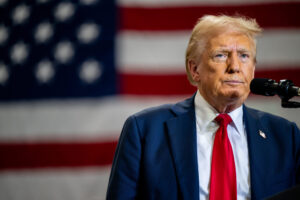8:00
News Story
Josh Hawley hopes to use Lucas Kunce fundraising against him in Missouri Senate race
The majority of itemized donations to Kunce and Hawley come from outside the state, making up more than half of the total each has raised
In his re-election campaign, Missouri Republican U.S. Sen. Josh Hawley wants to use Democratic nominee Lucas Kunce’s successful fundraising effort as a weapon.
Since the start of 2023, Kunce has collected $11.2 million, all but about 3% from individuals giving in amounts ranging from less than $1 to the maximum contribution of $3,300. Hawley, who has raised a little more than $9 million through his campaign and joint fundraising PAC in the same period, has also collected more than 90% of his funding from individual donations.
That makes Kunce the best-funded Democrat in a statewide contest this year. He opened the fall campaign with nearly $1 million in television advertising that began a week before the primary. Hawley has countered with more than $700,000 in ad buys, as tallied by The Independent from broadcaster reports to the FCC.
A key strategy of Hawley’s campaign so far has been to paint Kunce as out-of-touch with Missouri voters and funded by out-of-state interests.
“It’s no surprise that Lucas Kunce has been outraising my campaign with the help of California millionaires, but I won’t back down,” Hawley said in a recent fundraising email to supporters.
In a face-to-face confrontation with Kunce last week at the Missouri State Fair ham breakfast, Hawley repeated his attacks.
“This guy, over 60% of his contributions come from outside the state,” Hawley said, “He’s taking money from Bain Capital, for heaven’s sake.”
“I have never taken money from Bain Capital,” Kunce responded. “I take money from individuals. Our average donation is $30. We have donations from all 114 counties.”
Asked about the attacks after he and Hawley separated, Kunce said it shows Hawley cannot win on a campaign that compares policy positions.
“He doesn’t want to talk about anything that he’s actually done, and he wants to just make up other stuff to attack me on,” Kunce said. “”We’ve never taken money from a corporate PAC, I can tell you that much. And so if Bain has a corporate PAC I have not taken money from it.”
The Independent analyzed the fundraising reports of each candidate to test Hawley’s attacks The analysis revealed:
- The majority of Kunce’s itemized donations are from outside the state, as are Hawley’s.
- The list of Kunce’s donors includes some famous Hollywood names, including actors John Goodman and Jon Hamm, both born in Missouri.
- Hawley has promised to refuse donations from corporate PACs, a stance he adopted after dozens of corporate donors halted contributions to lawmakers like Hawley who voted against certifying the results of the 2020 presidential election.
- The statement that Kunce is “taking money from Bain Capital” is based on $5,800 donated to his failed 2022 Democratic primary race from an individual who listed the company as their employer.
Here or there
Each candidate’s report lists hundreds of donations of less than $1 and thousands below $10. The vast majority of that money is raised through small-donor conduits aligned with each party, ActBlue for the Democrats and WinRed for Republicans.
Those platforms have helped the parties nationalize races in individual states, and hundreds of candidates in each party raise money through them.
It is true that a majority of Kunce’s itemized individual donations are from outside Missouri, with about 38% of the listed donations and about 41% of the total. The list of almost 54,000 donations – with 20,529 from Missouri – includes many multiple entries for repeat donors.
Kunce said he’s got no apologies for where his donors live.
“We built a real grassroots movement around here,” he said. “And I think that Josh Hawley just doesn’t want to talk about anything that he’s actually done or proposes to do.”
Hawley’s list of individual donors, both since he joined the Senate in 2019 and during the current two-year election cycle, is weighted even heavier to out-of-state donors.
Of his almost 55,000 individual donations listed since he took office, 23% are from Missouri, providing about 38% of the total for those donations. Since the start of 2023, only 22.5% of the itemized donations came from Missourians, contributions that equal 31% of the money Hawley reported in itemized receipts.
Asked whether voters should be concerned that most of his donations come from outside the state, Hawley turned back to his criticism of Kunce.
‘He does not represent our state,” he said.
Neither candidate reports the name of every donor. Federal law allows campaigns to omit the names of donors who give $50 or less.
Kunce does not disclose the donors of $6 million he has received and Hawley has not disclosed the donors for $2 million collected since the start of 2023.
California donors
Both candidates have reported hundreds of thousands of dollars from contributors in the Golden State, but it is by no means the main source of funding for either Kunce or Hawley. Along with Hamm, who regularly lends his name to fundraising appeals, and Goodman, who narrated a two-minute video for Kunce, the list includes Mark Hamill, the original Luke Skywalker from Star Wars, late-night talk show host Jimmy Kimmel and Michael Shamberg, producer of “A Fish Called Wanda” and “Erin Brockovich.”
“He just got another Hollywood actor to narrate a video for him,” Hawley said after the confrontation at the state fair, adding: “The guy is totally out of step in Missouri. That is my point.”
The Goodman video will not only show up in various media as an ad for Kunce, he is using it to showcase his message to potential donors.
“John Goodman is a born-and-raised Missourian who knows real family values,” an email appeal stated. “He learned them the same way I did, by growing up in a beautiful community where people took care of each other — through good times and tough times.”
In all, Kunce reported about $589,000 from California donors, while Hawley has $251,424 since the start of 2023 and $334,758 since he took office.
PAC donations
During his first two years in office, the portion of Hawley’s campaign finance report where committee donations are listed looked like many from both parties, with interest group PACs of various stripes chipping in.
The list of $91,000 in donations includes corporate PACs for companies like AT&T, Fedex and Citigroup and farm commodity PACs such as The National Cotton Council, the California Rice Industry Association and the National Sorghum Producers, among others.
But then came Jan. 6, 2021, when a violent mob broke into the U.S. Capitol Building while Congress was counting the presidential electoral vote. Hawley not only was the first member of the Senate to announce he planned to challenge the votes of several states, he was photographed with a defiant fist-raised encouragement to members of the group that eventually breached the security perimeter.
The reaction from some of Hawley’s biggest backers was intense and immediate.
David Humphreys, president and CEO of Tamko Building Products in Joplin, denounced Hawley as a “political opportunist” who used “irresponsible, inflammatory, and dangerous tactics” to incite the rioting that took over the U.S. Capitol Building. Humphreys and his family provided $4.4 of the $9.2 million Hawley raised in his campaign for Missouri attorney general in 2016.
Along with corporate donors who vowed to stop giving to the Republicans who objected to certifying the electoral vote, some donors, such as Kansas City-based Hallmark Cards Inc., asked for Hawley to return their money.
Since the start of 2021, Hawley has reported only a handful of corporate PAC donors and none since the start of 2023. He has received donations from lobbying interests – the American Israel Public Affairs Committee, the National Association of Realtors and the American Crystal Sugar PAC among them – and one union, the Teamsters.
Hawley has also taken donations from 21 PACs associated with other members of the Senate or prominent Republicans, including Working for Ohio, the leadership PAC associated with GOP vice presidential nominee Sen. J.D. Vance, and the Bluegrass Committee, the leadership PAC for Senate Minority Leader Mitch McConnell of Kentucky.
“You can go ask Mitch about our relationship and whether or not I’ve supported him for leader,” Hawley said in an interview at the Missouri State Fair. “I’ve never supported him for leader, and I’m not going to.”
Hawley said he wasn’t even aware McConnell’s PAC had donated this cycle.
“Fantastic,” he said. “If he wants to give me money to criticize him, I’ll take it.”
All of the leadership PACs that have given to Hawley accept corporate PAC donations.
Hawley said he doesn’t check where the leadership PACs get their money before depositing their donations.
“I don’t know what other people get,” Hawley said. “I can control what I get, and I do not accept corporate money.”
Publicly refusing corporate PAC funding while accepting donations from PACs that raise significant cash from corporate contributors is hypocritical, Kunce said.
“He’s laundering the money,” Kunce said. “The guy’s being a fraud about it. I’m proud of the way that we don’t take corporate PAC money, no federal lobbyist money and no big pharma executive money.”
Kunce has accepted 46 donations from PACs since the start of 2023 – 36 from PACs associated with unions and the rest from committees that have a partisan bent toward Democrats. The Democratic PACs all raise money from small donors.
Union PACs are different from corporate PACs, Kunce said.
“Union PACs are created to empower everyday people, to give power to everyday folks…and change who has power in this country,” Kunce said. “Corporate PACs are set up so that corporations can remain in power over the rest of us.”
Bain Capital
The name of Bain Capital is a dirty word in some Republican circles.
The venture capital firm was founded and led initially by U.S. Sen. Mitt Romney of Utah – the GOP’s 2012 nominee for president and one of former President Donald Trump’s most vocal Republican critics.
In 2022, when Kunce sought the Democratic nomination for the U.S. Senate, he accepted $5,800 in donations from contributors who listed their employer as Bain Capital. None of his individual donations in the current cycle are from people employed by Bain.
There was no significant carryover from the 2022 campaign to the present effort. In his October 2022 report, Kunce listed $26,350 in cash on hand and $164,983 in debts.
But for Hawley, those donations from 2022 are enough to justify his attack.
“When you suck money from Bain Capital, you may as well put ‘owned by Wall Street’ right on your chest,” Hawley said at the campaign stop in Boonville.
Kunce, asked about the donations, said every contribution from an individual represents support for his issues, not the corporate interests of the donor’s employer.
“We’ve never taken money from a corporate PAC, I can tell you that much,” Kunce siad. “And so if Bain has a corporate PAC I have not taken money from it.”
What it means
Unlike the 2018 election, when Hawley defeated Democratic U.S. Sen. Claire McCaskill, there has been little evidence super PACs – groups that can accept unlimited donations – intend to make a major effort in the state.
In 2018, Hawley and McCaskill combined to spend about $50 million, with about $39 million raised and spent by McCaskill. Outside groups spent $76 million more, according to the campaign finance tracking site Open Secrets.
The dynamic could change if polls show Kunce’s early ad effort puts him within striking distance, or if national groups see an opening because abortion rights and minimum wage ballot measures impact other campaigns.
YOU MAKE OUR WORK POSSIBLE.
Our stories may be republished online or in print under Creative Commons license CC BY-NC-ND 4.0. We ask that you edit only for style or to shorten, provide proper attribution and link to our website. AP and Getty images may not be republished. Please see our republishing guidelines for use of any other photos and graphics.





